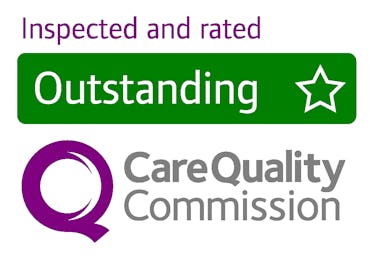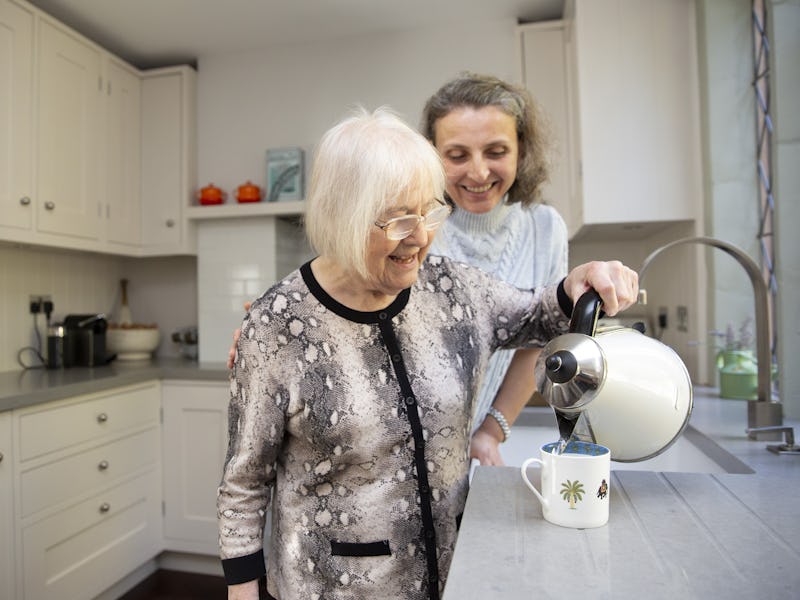Long-term care options explained

Residential care homes
A residential care home is a long-term assisted care facility that provides accommodation, personalised care, and support to individuals who are unable to live independently. A care home will be registered with the Care Quality Commission (CQC) in England and is required to meet specific standards regarding quality of care, safety, staffing, and accommodation.
Residents have their own private rooms and have access to communal areas such as lounges, dining rooms, and gardens. Care will be provided by carers who will assist residents with personal care, medication, and the tasks of daily life. Social and recreational activities are organised to promote socialisation and engagement among residents.
Live-in care
Live-in care is often overlooked as an alternative to a residential care home, as many families do not fully understand how a live-in care arrangement works. Live-in care is when a full-time carer lives in your home to provide you with one-to-one care and support 24 hours a day. You will need to provide a bedroom for your live-in carer, and they will eat the food you eat and whilst they will sleep when you do, they are on hand should you need them through the night.
A regulated live-in care provider, like Trinity Homecare is regulated by the Care Quality Commission (CQC) so the quality of care is inspected to ensure the service is of the highest quality. We are very proud our service has been rated ‘Outstanding’ by CQC.

Live-in care vs a care home
Both care homes and live-in care aim to provide safe, effective, and personalised care that enables a person to live well. Everyone is unique and requires different types and levels of care depending on their needs and preferences. We have provided benefits and limitations for both live-in care and care homes, so you have the information you need to make the right choice for you and your loved one.
Benefits and limitations for live-in care and care homes
Live-in care
| Positives | Negatives |
|---|---|
| Highly personalised one-to-one care – something that cannot be achieved in a care home | Adjusting to a carer living in your home |
| Stay in the comfort and familiarity of the place you love the most – your own home | Home maintenance is still needed |
| The same care team will provide care and support offering continuity of care | Home modifications may be required |
| Complex care needs can be supported | |
| Live the life you want with choice and independence – no restrictive routines or visiting times | |
| Maintain friendships and community connections | |
| The family estate remains where it should be – with the family | |
| Cost-effective care option and especially economical for couples |
Care homes
| Positives | Negatives |
|---|---|
| A safe and secure environment | Upset, stress and upheaval of leaving your much loved home |
| No home maintenance is needed | Leaving your local community |
| Can share your life with other like-minded people | Loss of family pet |
| Can still be a part of the local community if moving into a care home locally | If you are a couple and move into a care home, you may be on different floors if you have different needs |
| Activities and social events are regularly organised | Downsizing to living in one room |
| One carer will be caring for up to six residents all with different needs | |
| Routines are imposed with fixed patterns as to waking, eating, and socialising | |
| Higher rates of hospital admission and infections | |
| The family home is likely to be sold to pay for care home fees, leaving nothing for the family | |
| Not bonding with other residents |
The four F’s to consider
Live-in care enables people to remain in a familiar environment where they feel most happy and safe. A residential care home will mean adjusting to new surroundings. This change can be particularly difficult for those who are diagnosed with a long-term illness such as dementia. Staying in a familiar setting can help reduce stress levels and improve mental well-being. However, all individuals are different, and some may find a fresh start within a care home is better for them.
Moving into a residential care home can offer an opportunity for a rich social life. It provides a structured environment filled with activities and the chance to form connections with other residents. However, it’s important to consider that it might limit personal independence and choices, potentially impacting privacy, and individuality. On the other hand, live-in care brings the advantage of a personalised social routine. It allows individuals to maintain their existing social circles, participate in community activities, and feel a deep sense of belonging in their own community or family circle.
The biggest difference between receiving live-in care at home or living in a care home is the freedom that it allows. Although care homes offer a structured environment and support for daily tasks, some individuals may find the loss of personal independence and decision-making challenging. However, live-in care allows individuals to maintain familiar routines, stay with their pets and have family and friends visit regularly.
The cost of live-in home care can vary depending on several factors, including the location, level of care required, and the agency or provider you choose.
The fee charged for live-in care will cover the following:
- Carers salary
- Agency fee
- Personal care
- Housekeeping
- Supervision of medication
The fees for moving into a residential care home, cover a range of services and amenities. The specific services included in the fee can vary depending on the facility and the level of care required.
The fee for a care home may cover:
- Accommodation
- Meals and nutrition
- Housekeeping
- Utilities
- Maintenance and repairs
- Medication management
It’s important to note that the specific services and amenities covered by the care home fees can vary. When considering a particular care home, it’s advisable to request a detailed breakdown of what is included in the fees and clarify any additional costs that may apply.
It is important to thoroughly research and gather multiple quotes from agencies and care homes around your area to get a more accurate understanding of the costs that are involved.
If you would like a more detailed summary of what live-in fees cover, please get in touch with our friendly team on 020 4530 8354.
“2 million British people know an elderly person who has had to put their pet to sleep when moving into residential care
- The Live-In Care Hub Report, 2014
What do you need to consider?
Determining what type of care is most suitable for you requires a lot of consideration of various factors.
Such as:
- Level of care – Including any medical conditions, mobility, or assistance needed with everyday tasks
- Which care option helps best with your independence and social engagement
- What are the financial implications – which option is more attainable for you?
- Their personal preference
Involving family members or healthcare professionals like your GP, is a great way to help provide a different perspective and guide you to making the right choice.
Why Choose Trinity?
We have been providing our high-quality live-in care service trusted by families across England for over 25 years. Our multi-award-winning care is focused on enabling independence and enriching lives, so that people can stay safely and happily in the comfort of their own home. Families benefit from reassurance and peace of mind that their loved one is receiving the very best care provided by a dedicated team of carers.

Live in care rated ‘Outstanding’
Our established service is regulated by the Care Quality Commission (CQC) in England and has achieved the highest ‘Outstanding’ rating for the quality of care we provide. Only 3% of homecare companies in England have achieved this rating. This means that you can be assured that you are receiving the very highest standards of care at home.

A responsive and flexible service
We appreciate that circumstances may mean you need to put care in place quickly. Our expert care team can set up live in care in as little as 24 hours, sometimes sooner. We will work with you and your family to ensure you have the right care team in place exactly when you need it.

A trusted homecare service
We know how important trust is when choosing a live in care provider. Many families who trust us to provide high-quality care to their loved ones have happily shared their experiences of our service on the rate and review website homecare.co.uk and on Working Feedback, giving us a 5 star rating.

Continuity of care
We have a dedicated team of carers some of whom have been working for Trinity for many years. This means they are committed to us, as we are to them which means they stay with us longer. For families this means that you get continuity and consistency of carers supporting your loved one, minimising disruption to daily life.

Local care teams close to you’
Whilst we operate throughout England, our live-in care service is delivered locally to you. Our care management team support carers and families on a regional basis, ensuring the highest levels of monitoring and support, whilst ensuring a personalised approach to care delivery.

Managed by a team of market leaders
Our clients, their families and our care teams are supported by central team of in-house professionals, including recruitment, client services, operations, finance, IT and marketing, which enables us to deliver the very highest standards of care and client experience.
If you’ve decided you’d like to go with live-in care, please contact us today to speak with a member of our friendly team on 020 4530 8354 who will offer their expert advice and guidance about your live-in care options. If enquiring outside of our opening hours, please complete our online form and we will contact you the next working day.
















